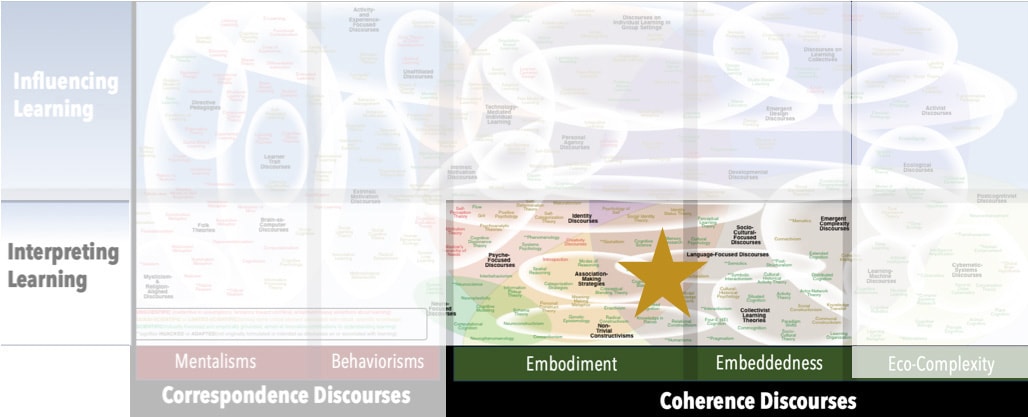Focus
The origins and locations of meaningPrincipal Metaphors
- Knowledge is … scope of possible meanings
- Knowing is … coherent interpretation
- Learner is … a meaning-making system
- Learning is … construing webs of association
- Teaching is … N/A
Originated
1910sSynopsis
Structuralism suggests that meaning arises and resides in webs of association – not in objects, the words that name objects, or the links between words and the things they designate. This point might be illustrated by comparing English and Chinese. It’s impossible to translate complicated meanings from one to the other by exchanging words; rather, networks of association must be considered, sometimes involving very different images and metaphors. The same notion is applied to individual thought: Deep meaning does not reside in specific words, images, emotions, etc., but in a broader, overarching systems or structures. Associated discourses and constructs include:- Linguistic Relativity (Sapir–Whorf Hypothesis; Whorfian Hypothesis; Whorfianism) – the observation that forms and phenomena are categorized differently in different languages, potentially giving rise to consequentially different associations among activities, interpretations, and perceptions across language systems. (Contrast: Linguistic Determinism, under Determinisms.)
- System of Difference (Ferdinand de Saussure, 1910s) –a Structuralist notion associated with the assertion that the meanings of words and propositions arise in contrasts and gaps – differences – among those words, not through any sort of direct correspondence to objects of events.
Commentary
Structuralism has been frequently criticized as ahistorical, overly deterministic, reliant on binary oppositions, self-sufficient (closed), and lacking flexibility. The last of these points has proven to be its major downfall, as some of the theories it spawned (esp. Post-Structuralism) have demonstrated that meaning may have more to do with a language’s (or other system’s) ambiguous and shifting associations than its imagined-to-be logical or crystalline structure.Authors and/or Prominent Influences
Ferdinand de Saussure; Claude Lévi-StraussStatus as a Theory of Learning
Structuralism is not normally identified as a theory of learning. However, it provided the frame that infuses most Non-Trivial Constructivisms, and it might thus be characterized as a trans-level theory of learning – that is, one that offers a theory of meaning-making that applies at both individual and cultural levels.Status as a Theory of Teaching
Structuralism is not a theory of teaching.Structures as a Scientific Theory
As per the Commentary noted above, it appears that Structuralism falls short of a scientific theory, especially around the matter of contradictory evidence that can be better explained by other theories.Subdiscourses:
- Linguistic Relativity (Sapir–Whorf Hypothesis; Whorfian Hypothesis; Whorfianism)
- System of Difference
Map Location

Please cite this article as:
Davis, B., & Francis, K. (2023). “Structuralism” in Discourses on Learning in Education. https://learningdiscourses.com.
⇦ Back to Map
⇦ Back to List
